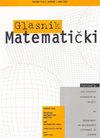关于皮莱的斐波那契数和定素数幂问题的多重性
IF 0.5
4区 数学
Q3 MATHEMATICS
引用次数: 2
摘要
设\( \{F_n\}_{n\geq 0} \)为斐波那契数列,设\(p\)为素数。对于整数\(c\),我们将\(c\)的不同表示形式的数量写成\(m_{F,p}(c)\),例如\(F_k-p^\ell\)与\(k\ge 2\)和\(\ell\ge 0\)。我们证明\(m_{F,p}(c)\le 4\)。本文章由计算机程序翻译,如有差异,请以英文原文为准。
On the multiplicity in Pillai's problem with Fibonacci numbers and powers of a fixed prime
Let \( \{F_n\}_{n\geq 0} \) be the sequence of Fibonacci numbers and let \(p\) be a prime. For an integer \(c\) we write \(m_{F,p}(c)\) for the number of distinct representations of \(c\) as \(F_k-p^\ell\) with \(k\ge 2\) and \(\ell\ge 0\). We prove that \(m_{F,p}(c)\le 4\).
求助全文
通过发布文献求助,成功后即可免费获取论文全文。
去求助
来源期刊

Glasnik Matematicki
MATHEMATICS, APPLIED-MATHEMATICS
CiteScore
0.80
自引率
0.00%
发文量
11
审稿时长
>12 weeks
期刊介绍:
Glasnik Matematicki publishes original research papers from all fields of pure and applied mathematics. The journal is published semiannually, in June and in December.
 求助内容:
求助内容: 应助结果提醒方式:
应助结果提醒方式:


